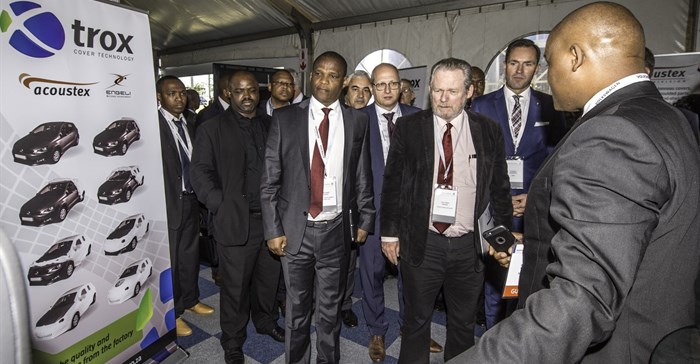
The event presented a platform for 45 companies - out of 430 applications - that met VWSA’s stringent supplier criteria to profile themselves to the local automotive industry. Successful organisations had to have a minimum of 51% black ownership (includes Coloured, Indian and Chinese as per BBBEE guidelines) and/or a minimum of 30% black female ownership. Another key requirement considered by VWSA was companies that are owned or managed by disabled persons or war veterans. The event was anchored by a conference of speakers and drew audiences from the broader automotive industry and other global automotive brands like BMW, Toyota, Ford and Mercedes.
One of the highlights of the day’s programme was a ministerial roundtable that discussed how black industrialists and black-owned suppliers could be assisted to be part of the automotive sector. The participants were: Minister Rob Davies; the CEO of the Black Business Council, Mohale Ralebitso; CEO of the Automotive Industry Development Centre, Dr David Masondo; and Philisiwe Mthethwa, the CEO of the National Empowerment Fund (NEF).
VWSA chairman and managing director, Thomas Schaefer, said that the concept for the Supplier's Day originated from the company's desire to support economic transformation, but he cited some difficulties experienced due to current legislation.
“We understand government’s priority elements of the BBBEE codes and the drive for ownership. We, however, have difficulty complying with the Enterprise and Supplier Development element set out in the recently-revised BBBEE mandate. This is not because we do not want to, but because it is virtually impossible given the scarcity of black-owned suppliers to the local automotive industry. In our case, this is compounded by our high level of local content in the manufacture of Polo and Polo Vivo,” explained Schaefer.
Some of the speakers cited an incubation ecosystem as an important consideration to promote black participation in automotive manufacturing and improving the local industry on a whole. Mthethwa stated the following in her address: “As the NEF we have found that incubation can go a long way towards establishing and nurturing enterprises that can supply components to automotive production lines.”
Masondo said the automotive sector must view the incubation proposition within the broader context of the need to reindustrialise the economy and increase local production on a grand scale. And Minister Davies stated that the industry must find a way to deepen and broaden its supplier base in line with empowerment regulations. Incubation, said Davies, is one of the best ways to uplift new entrants.